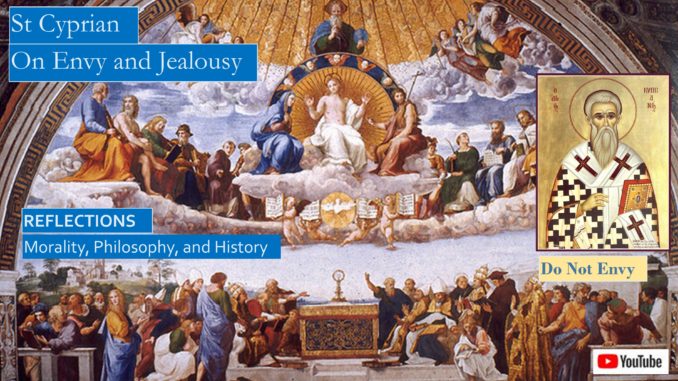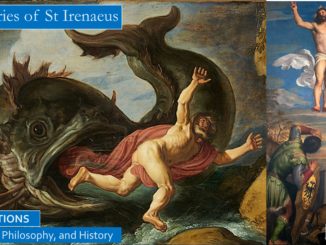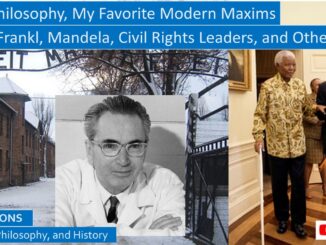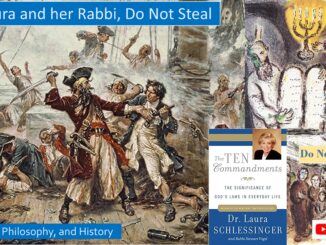
St Cyprian teaches us that “envy is the root of all evils, the fountain of disasters, the nursery of crimes, the material of transgressions.”(#6) Envy and jealousy is pernicious and hazardous because it seems so harmless, a “slight and petty wrong.”(#1) Who doesn’t feel a tinge of jealousy at our neighbor’s new car or nice house or fancy furniture? Who isn’t resentful when someone else who is not nearly so deserving is promoted ahead of us? How often do we rejoice at our neighbor’s good fortune, at our co-worker’s promotion?
St Cyprian warns us of the pernicious evils of envy. “What a gnawing worm of the soul envy is, what a plague-spot of our thoughts, what a rust of the heart, to be jealous of another.” How envy gnaws at our soul when we hate our neighbor for their prosperity, their good luck, their inheritance, when we make other people’s glory our penalty, when we allow envy to be the executioner of our soul. When we are consumed by envy, “no food is joyous, no drink is cheerful. The envious are every sighing and groaning and grieving,” our envy torments us day and night.(#7)
The YouTube video includes some introductory material and a discussion of his preceding essay on patience that is not in this blog: https://youtu.be/_LIwHZCzDfg
YouTube script with book links: https://www.slideshare.net/BruceStrom1/st-cyprian-early-church-father-on-coveting-envy-and-patience
The best eBooks for the Ante-Nicene Fathers can be purchased at https://www.christianbook.com
As evil as theft is, once you have the ill-gotten goods the theft is done. As evil as adultery is, once the night is over the deed is done. As evil as murder is, once the murder is committed the victim is buried. But you never can bury envy, “jealousy has no limit, it is an evil continually enduring, envy is a sin without end.” The greater the success of our neighbor whom we envy, the more we fan the flames of jealously, the hotter are the fires of envy in our soul.(#7)
Envy was the original sin of Satan, created in “angelic majesty, accepted and beloved of God. But when the Lord made man in His own image, Satan broke forth into jealousy with malevolent envy,” hurling himself from the heights of envy into the abyss of envy, envy making him “captive before he takes others captive, envy ruining him before he ruins others,” envy deceiving the great deceiver before he deceives the whole of the human race. “Envy rages on the earth, and he who perishes by envy imitates the deceiving devil in his jealousy.”(#4)
St Cyprian quotes the Wisdom of Solomon,
“God created us for incorruption,
and made us in the image of his own eternity,
but through the devil’s envy death entered the world,
and those who belong to his company experience it.”[1]
St Cyprian joins many of the other Church Fathers when he teaches us that envy was the sin that led to Cain murdering his brother Abel. St Cyprian says, “the unrighteous Cain is jealous of the righteous Abel,” and like today, “the wicked persecutes the good with envy and jealousy.” Such was the “rage of his envy that led to the consummation of this wicked deed, that neither the love of his brother, nor the immensity of the crime, nor the fear of God, nor the penalty of sin, was considered.”(#5)
St Cyprian also gives us the example of Esau and Jacob. We will later explore this interesting saga of the Jacob story, how love eventually after many decades reverses the resentments caused by theft and deceit. One the one hand Jacob was originally at fault for stealing his brother’s birthright by deceiving his father for the blessing due the first-born son, Esau, but on the other hand Esau did not value his birthright, selling it for a mere bowl of porridge. Although Esau was the aggrieved party, St Cyprian teaches us that the jealousy Esau felt towards Jacob fanned his hatred so that Jacob was forced for flee for his life. Envy is dangerous because it often stands in the way of forgiveness, so the Jacob story is a better story than most because they are redeemed when Esau forgives his brother Jacob.(#6)
St Cyprian also gives us the example of Joseph, who was sold into slavery by his brothers. Their envy led to anger when he told them of his dream that one day they would all bow down to him.(#6) Many commentators have noted that Joseph may be at fault for repeating this dream, that he was guilty of stirring up envy by reminding his brothers that he was the favored son of their father. This story not only has Joseph eagerly forgiving his brothers, but also has his brothers repenting of their sins against Joseph.
The stories of Jacob and Esau and, to a lesser extent, Joseph and his brothers, are interesting because in these stories everybody is a victim, and you can see that the victim who was envied was not so much the victim, that he brought the envy upon himself by his own actions. As an example, let us say your co-worker who was promoted ahead of you was not only less deserving, but he stole your ideas and slandered your performance to increase his standing at work. Could not a little bit of jealousy be forgiven? Would you want to congratulate him on his promotion? The only way that would be possible is if you were able to forgive him, indeed, be eager to forgive him.
Perhaps just as Joseph taunted his brother with his dream of them bowing down and worshiping him, so perhaps Abel also taunted his brother Cain with the preferential favor the Lord showed him for his sacrifice. If that is true, then the comment of the Lord to Cain that sin is crouching at his door, that he must master it, would make more sense, maybe Abel was not totally innocent. What we do know if our eagerness to forgive our brother, our reluctance to find fault with our brother, this kindness of heart and love of our brother also combats the demon of envy.
St Cyprian asks, Why we feed the flames of envy in our heart? “Why do you rush into the darkness of jealousy? Why do you wrap yourself in the cloud of malice? Why do you quench all he light of peace and charity in the blindness of envy? Why do you return to the devil, who you had renounced? Why do you stand like Cain?” “Everyone who hates his brother is a murderer.”(#11)
When we focus on this evil of envy, we see many of the other verses we have heard so many times in a different light. Who are the opposite of those who constantly seek to fan the flame of the envy in their hearts? Perhaps the opposite is the image of these saved who are seen as sheep. As St Cyprian teaches us, “We ought to remember by what name Christ calls His people, by what title He names His flock. He calls them sheep, that their Christian innocence may be like that of sheep. He calls them lambs, that their simplicity of mind may imitate the simple nature of lambs.”(#12) Those who are as innocent as sheep, those who are as simple of mind as lamb, those are the true Christians for whom envy is banished from their hearts.
What is the opposite of the envy that constantly torments our souls every time we witness the fortunes and happiness of our neighbor? How do we guard against this ever-consuming jealousy? The opposite of perpetual envy is ceaseless prayer. Our minds must be strengthened by meditations and divine readings, the Lords thoughts must always be in our minds, “let constant prayer never cease, let saving labor persevere.” We question what it means to pray without ceasing, perhaps the answer is that the question itself is absurd, we always pray, our unceasing prayer is what haunts or comforts our consciousness all the hours of our days, do we allow our waking thoughts to be consumed by ceaseless jealousy and envy, or are we comforted by our waking thoughts of kindness and prayer? Are we eager to forgive our neighbor?
Jesus said, “You have heard that it was said, ‘Love your neighbor and hate your enemy.’ But I tell you, love your enemies and pray for those who persecute you, that you may be children of your Father in heaven. He causes his sun to rise on the evil and the good, and sends rain on the righteous and the unrighteous.”[2] This commandment that we should love both our neighbor and our enemy, does this also imply that it would be just as abhorrent to envy the unrighteous as the righteous?
St Cyprian teaches us, the “Lord bids us to be prudent, watch carefully, lest the adversary, who is always watching, who is always lying in wait, who seeks to creep stealthily into our breasts and blow up a flame from sparks, . . . stirring up storms and whirlwinds, bringing about the destruction of our faith and wrecking the ship of our salvation and eternal life.”(#1)[3] Envy leads to all other sins, hatred of our neighbor, to theft, to adultery, to murder, to false witness. Like the Lord warned Cain, envy is the sin that crouches at our door that we must master before we can love our neighbor and our God.
[1] https://www.biblegateway.com/passage/?search=Wisdom+2%3A23-24&version=NRSVCE
[2] https://www.biblegateway.com/passage/?search=matthew+5%3A43-45&version=NIV
[3] St Cyprian, “Treatise X, On Jealousy and Envy,” in The Treatises of Cyprian, In the Ante-Nicene Fathers, Volume 5, translated by Rev Ernest Wallis (Boston: Hendrickson Publishers, 1994, first published 1886), pp. 491-496.




2 Trackbacks / Pingbacks